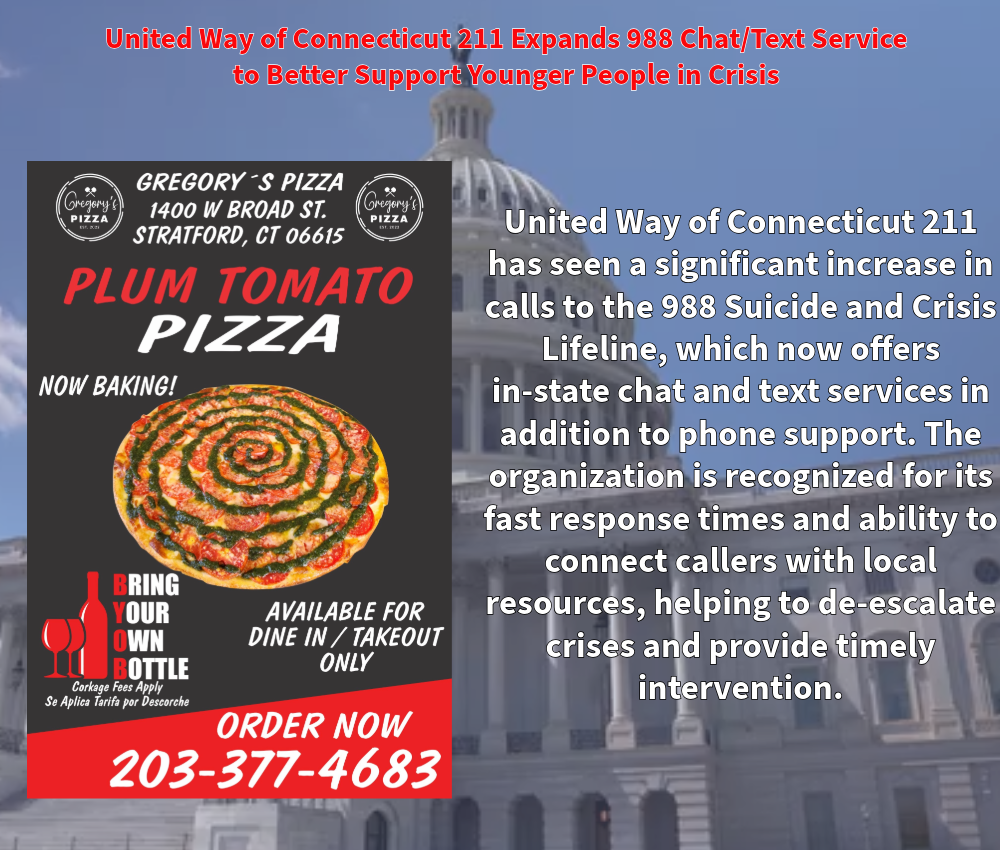
September is National Suicide Prevention Month – an important time to raise awareness about 988, a dedicated line that connects Connecticut residents to the United Way of Connecticut 211 mental health crisis services team.
ROCKY HILL (September 16, 2024) — When someone is in crisis, or worried about someone in crisis, 988 is the first stop. Twenty-four hours a day, seven days a week, local help is available by phone, and since February of this year, by chat and text.
The Substance Abuse and Mental Health Services Administration (SAMHSA) launched 988 nationwide on July 16, 2022, as a new, easy-to-remember Suicide and Crisis Lifeline. United Way of Connecticut 211 has provided the National Suicide Prevention Lifeline service (now the 988 Suicide and Crisis Lifeline) for more than 40 years, in close partnership with the Department of Mental Health and Addiction Services (DMHAS). At the launch of the new three-digit exchange, 988, United Way of CT Crisis Contact Specialists assisted callers, but a national back-up center responded to chats and texts.
In its first year of 988 service, United Way of Connecticut 211 saw a 125% increase in suicide prevention and mental health crisis calls. In fiscal year 2024, their crisis services team answered more than 46,000 988 calls – an increase of 32% from 2023. The 211CT crisis services team answers 96% of all 988 calls in an average of five seconds – beating the nationally required 95% in 15 seconds.
“To serve more CT residents locally, especially younger people in crisis, we launched our in-state chat and text service on February 6, 2024, initially operating weekdays, 8:00 a.m. to 3:30 p.m.,” said Tanya Barrett, Senior Vice President of 211 Health and Human Services. According to the Kaiser Family Foundation, local resource knowledge is a particularly important reason for contacts to be fielded by local crisis counselors. “As of August 1, we’ve now expanded our hours of chat and text operations to seven days per week. Between February and August, we responded to more than 1,100 chats and texts.”
United Way of Connecticut 211 reports that most of the chat and text interactions came from young, white females ages 13 to 25 who prefer text (70%) to chat (30%).
Barrett shares, “We know that many younger people are most comfortable communicating through chat or text. Responding to these 988 chat and text messages in-state is important because local 988 contact specialists know the specific stressors of our community and know the resources and supports best. That means the best possible help, most quickly, for those in need.”
“Whether people in crisis reach us through a phone call, a chat, or a text message – the support on the other end of the line, the backbone of 988 in CT, is our Crisis Contact Specialist team,” says Lisa Tepper Bates, President and CEO, United Way of Connecticut. “Our team consistently ranks among the top 988 call centers in the nation for speed-to-answer – we know that lives can depend on picking up the phone and providing support quickly.”
For the newly launched in-state chat and text service, the 211CT team maintains that stellar performance; they answer each interaction within nine seconds, and the interactions average 81 minutes in length.
DMHAS Commissioner Nancy Navaretta shares, “Our nation is in the midst of a mental health crisis, and here in Connecticut, we are proud of our comprehensive and continually evolving crisis services, including the 988 Lifeline. The simplicity of the 988 number has significantly improved accessibility for people of all ages who may be struggling emotionally or experiencing thoughts of suicide. The establishment of this service enables timely intervention. For every individual who dies by suicide each year, there are more than 300 others who seriously consider it but don’t take action. It is often the personal connection made with a compassionate and empathetic 211 Contact Specialist, whether through a call, text, or chat, that opens the door to a different, more hopeful outcome for individuals and their families.”
“Our Contact Specialists do heroic work every day: they meet each caller where they are, taking the time to understand each person’s needs, de-escalate the crisis, and offer options for support. Our staff are truly amazing human beings who handle difficult calls with empathy and compassion,” says Bates. “In FY’24, 92% of adult callers reported that their state of crisis diminished while on the phone with a 211 crisis specialist. There is no more important result for these callers.”
But when more intensive help is needed urgently, their crisis services team can connect callers to mobile crisis services – for adults as well as children. These teams of mobile crisis clinicians can go directly to where an adult or child in distress is located. This service is recognized as a best practice but is not yet offered in all states and communities. Connecticut leads the nation in providing mobile crisis support as part of its crisis response services continuum.
And while their crisis team will engage in active rescue when needed, United Way of Connecticut reports that less than 1% of all crisis calls this past year required escalation to 911 for active rescue or medical emergency response.
“At the end of the day, and though these statistics and metrics matter, they are just numbers. We know that what matters most is the individual person, the individual life, on the other end of the phone, or the other side of the chat or text,” says Tanya Barrett. “It is thanks to our partners in suicide prevention and crisis response at DMHAS, Department of Children and Families (DCF), and Department of Public Health (DPH), that CT residents have access to a wide array of services across the crisis continuum.”
If you are struggling, in distress, and need crisis and suicide prevention assistance, reach out to 9-8-8 for a direct connection to professionally trained and educated 211 Crisis Contact Specialists – who are doing heroic work every day.
